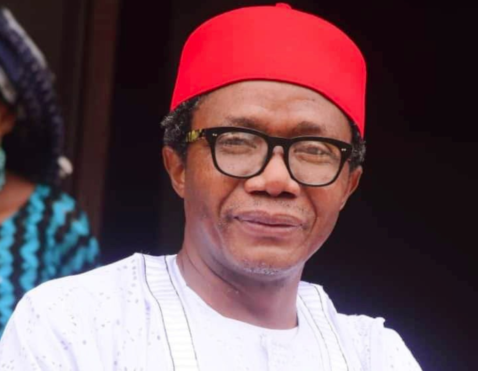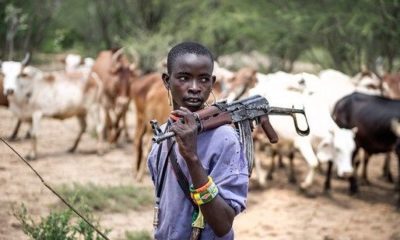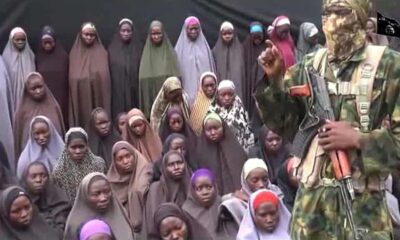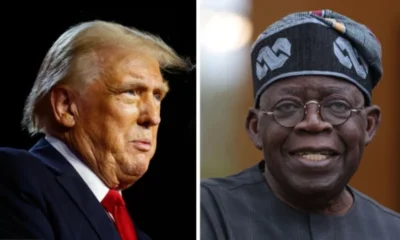
Opinion
National Anthem Change: Rat chase in house on fire, By Law Mefor

Priorities and the results of actions and inactions are important to life. The economic and security challenges present President Tinubu’s administration with at least two fronts of a national emergency. A man whose house is on fire doesn’t go after rats, but going for a change of the national anthem—which, incidentally, not many Nigerians think is a problem—makes just that impression. Every citizen is concerned about the growing economic and security problems, which the president needs to address head-on.
The World Bank and the IMF, two Bretton Woods institutions, enticed President Tinubu to abandon fuel subsidies and defend the naira, a step that previous Nigerian presidents fiercely opposed or implemented piecemeal. For the sole reason that he was eager to validate his disputed presidential mandate, which is still in dispute, and to gain worldwide influence as an ‘action president’, Tinubu fell for it and led Nigeria into a trap.
Even crude oil, which makes up about 75% of the country’s export earnings, was heavily mortgaged during the past Buhari administration. This indicates that just a portion of Nigeria’s oil exports are sold for income; the remainder is used to pay off debt and meet other commitments made to other countries.
To make matters worse, the naira was floated and made to compete with other world currencies in the absence of significant inflow from exports and external reserves that continued to decline from $35 billion at the start of the Tinubu administration. Braggadocio is no virtue. What chance does Tinubu’s economic team see for the naira against, say, the $1 trillion foreign reserve-backed Chinese yuan, not to mention the British pound, US dollar, EU euro, or Japanese yen? Yet, the presidency boasts that the naira is floating to find its level.
The naira, as the trend Is showing, has no level and needs to be defended and protected by all means. If not, it will collapse along with the nation’s economy. Because of the significant disruption and misalignment the naira floating and unplanned fuel subsidy removal have caused to the economy, the government is once again standing up for the naira, just like other nations do with their currencies.
The unplanned removal of fuel subsidies remains a tragic economic decision and another instance of braggadocio. Combined with naira floatation, the two policies dragged the economy into stagflation, with food inflation standing at about 40% as of today, a figure never recorded since Nigeria came into existence. As an example, in May 2023, when Tinubu took over, a basket of tomatoes sold for about N10,000. This week, tomatoes sold for N150,000. Yes, you read it right, and this kind of galloping inflation is not isolated. Virtually all goods have moved up by at least 300% and will leap further up when the new minimum wage comes into effect.

That’s what you get when you have rising prices for goods, expanding unemployment, and economic stagflation. That is what the country has to urgently deal with, yet the National Assembly and the presidency are more focused on changing the national song.
In actuality, both the previous and current national anthems had important messages and were appropriate. The old hymn “Nigeria, we hail thee” is a relic from the colonial era because it was composed during the rule of the British in colonial days in 1959 and was first rendered the Whites. In 1978, Gen. Olusegun Obasanjo changed it, ostensibly to create something genuinely indigenous and to strengthen the nation’s autonomy.
The succeeding anthem brought in by Obasanjo – “Arise, O’ Compatriots” – makes a lot of sense as well. So, changing to the old has nothing to do with meaninglessness or applicability. It smacks more of inconsequential politics and ego trips that detract from the economic and security crises, which are the main challenges unsettling Nigeria at the moment. The third challenge is corruption, which is still having a field day and growing more and more intractable.
Therefore, one cannot help but beg the president to concentrate on the important matters, give the nation’s economic and security challenges the emergency attention they require, and give less attention to unimportant and irrelevant issues.
Nigeria is a nation of farmers. The country’s economy is built primarily on agriculture, and not much has been done to move the country away from subsistence farming and towards mechanised agriculture. Terrorists, Janjaweed bandits, and killer herdsmen have destroyed even subsistence farming by evicting Nigerian farmers from their lands and causing food shortages and serious insecurity.
Farmers in many states now have to pay terrorists and bandits to gain access to their farms so they may plant and harvest crops, given the level of insecurity that has enveloped the land.
The proposed establishment of the state police is a wise decision because it will enable the people to use their state governments to defend themselves against terrorists and bandits invading the country and other groups of terrorists who are encircling the country like vultures and attacking everywhere like a pack of wild dogs. To reduce the possibility of state governor misuse, the establishment of state police would require extremely detailed legislative drafting. The national anthem change is not as urgent as security is. Yet, such frivolities are what preoccupy the FG and the NASS.
However, without the refineries in the country working, the price of fuel at the pump would not resettle favourably. Not a single refinery is operating a year after Tinubu entered office. As a private enterprise, the Dangote refinery has taken off. This is unlikely to provide any relief, though, as Nigeria is unable to provide crude to the Dangote plant due to both oil theft and the Buhari administration’s mortgage of crude. Because of this, Dangote refinery is now compelled to look for crude from the US.
In summary, the Tinubu administration ought to stop focusing on minors and shadowboxing and instead tackle the pressing issues of the economy and security.
The federal government must give the economic crisis urgent attention. FG has to work with state governments to break the electricity jinx and fix a workable state police.
What’s more, a lazy approach to the nation’s macroeconomic management would be to continue to tax a collapsing economy, tax citizens who have been robbed of their ability to pay by poor economic policies, and take more loans. The only options left are: getting into massive export and high-volume food production, ensuring import substitutions, and, of course, rooting out corruption. But this cannot occur unless the enablers, such as electricity and security, are first taken care of. It will not happen by squandering time and money on unimportant side issues that divert attention from the primary, urgent course of action that is required, certainly not reversing the national anthem.
•Dr Law Mefor, an Abuja-based forensic and social psychologist, is a fellow of The Abuja School of Social and Political Thought; drlawmefor@gmail.com; Twitter: @Drlawsonmefor
Opinion
2025 World Polio Day: Reflections on Rotary’s Humanitarian Journey — By Max Amuchie

For Rotarians the world over October 24 every year is a significant day, a day set aside to mark the World Polio Day. It also serves to commemorate the birthday of Jonas Salk, the man who developed the polio vaccine. For this year District 9127 under the leadership of the District Governor, Dame (Dr) Princess Joy Nky Okoro, hosted the other five Rotary International District Governors in the country in an all-Nigeria week-long celebration that lasted from October 17 to October 25.
Rotary’s dedication to eradicating polio is one of the most significant efforts in the history of public health and it’s involvement has been a game-changer, demonstrating the power of private-sector commitment to a global health goal.
Rotary began its efforts in 1979 with a multi-year project to immunise children in the Philippines. This led to the launch of PolioPlus in 1985, which was the first and largest internationally coordinated private-sector support of any public health initiative.
In 1988, Rotary joined with the World Health Organisation (WHO), the U.S. Centres for Disease Control and Prevention (CDC), and UNICEF to launch the Global Polio Eradication Initiative (GPEI). The Bill & Melinda Gates Foundation later joined as a key partner.
Rotarians worldwide have contributed over $2.9 billion and countless volunteer hours to the eradication effort. They also play a crucial role in advocating for and securing more than $11 billion in funding from donor governments.
Beyond money

For any Rotarian, the fight against polio is not just a humanitarian project—it’s a four-decade pledge that embodies the organisation’s motto of “Service Above Self.” It’s a commitment that goes far beyond financial donations, representing a unique blend of global advocacy, local action and persistent dedication until the last case of the wild poliovirus is found.
Nigeria’s Triumph: The Eradication of Wild Poliovirus
Nigeria’s success in ending wild poliovirus transmission is one of the most significant public health achievements of the 21st century. As the last country in Africa to eliminate the disease, Nigeria was certified free of wild poliovirus on August 25, 2020, an official declaration that certified the entire African region as wild polio-free.
This victory was the culmination of decades of dedicated effort, overcoming immense challenges ranging from conflict and remote geography to vaccine hesitancy.
In 2012 Nigeria accounted for roughly half of all global wild polio cases. It was a huge challenge, spurring a renewed, national priority effort.
Two years later, 2014 Nigeria was removed from the list of endemic countries and in 2016 the last case of indigenous wild poliovirus was recorded in Borno State.
Finally in 2020 Nigeria and the entire African Region got certified wild polio-free. The ultimate goal achieved achieved after meeting the stringent four-year zero-case requirement.
Nigeria’s victory proved that, with unwavering commitment and global partnership, even the most persistent and devastating public health crisis can be solved.
The Final Vow: Persistence in the Endgame
Rotarians have been fighting polio since 1979. The current stage, with the wild virus remaining endemic only in Afghanistan and Pakistan, demands the highest level of commitment and that’s exactly what Rotary International and Rotarians the world over have given and are committed to continue giving to completely eradicate this disease.
The ‘End Polio Now’ campaign is more than just a public health initiative; it is the single greatest embodiment of Rotary International’s core values. It serves as the clearest articulation of Rotary’s commitment to placing humanitarian causes at the centre of its identity, uniting millions of members behind a singular, transformative goal: to ensure no child ever suffers from the debilitating disease again.
At its heart, the fight against polio is driven by the foundational motto: Service Above Self. This principle demands an enduring, selfless commitment that far transcends local club projects. For Rotary, this translates into mobilising over $2.6 billion, deploying countless volunteer hours, and maintaining a relentless focus across political, geographical, and logistical barriers. It is a long game—a testament to Rotary’s sustained willingness to give its resources, time, and global influence not for credit or recognition, but purely for the well-being of humanity.
The scale of the initiative also perfectly aligns with the value of Fellowship and Global Reach. Polio eradication is a multi-national partnership involving the World Health Organisation, UNICEF, the US CDC, the Bill & Melinda Gates Foundation and the Sir Emeka Offor Foundation but it is anchored by the diverse network of Rotary clubs. Members from over 200 countries and geographical areas have collaborated, demonstrating that differences in culture or language dissolve when faced with a shared humanitarian objective. This global fellowship transforms individual local clubs into a unified force capable of complex, worldwide coordination, illustrating the power of diverse connections focused on a single mission.
Furthermore, the Polio fight embodies Integrity and Perseverance. Eradication is a slow, difficult, and often dangerous task, requiring Rotarians and frontline workers to operate in some of the most challenging regions on Earth like in crisis-hit Northeast of Nigeria. The continuous, ethical dedication required to reach the very last child with the vaccine, year after year, reflects the integrity of the process. There is no simple reward for Rotarians, only the steadfast determination to complete what they started, thereby proving that the commitment to a promise—the promise of a polio-free world—is immutable.
Polio is Rotary’s defining mission because it synthesizes every core value into concrete, life-saving action. It is the gold standard for global volunteering, showcasing how strong leadership, integrity in action, and a unified global fellowship, all centred on “Service Above Self,” can lead to the successful pursuit of the world’s most critical humanitarian objectives. When the final case of wild polio is recorded – that is when Pakistan and Afghanistan become polio free – it will be the ultimate validation of Rotary’s enduring purpose.
Reflections
People join Rotary for a variety of reasons that most times fall into two main categories namely the opportunity for Service and the benefits of Fellowship and Personal Growth.
Rotary has two official mottos. The one commonly cited is ‘Service Above Self’. This is the principal and most famous motto. It embodies the humanitarian spirit of Rotary and its members, emphasising that the primary purpose is to volunteer and serve the needs of others.
The older motto is One Profits Most Who Serves Best: This reinforces the idea that true reward comes from successful service to the community and the world.
If Rotarians live by this dual credo and apply them in their daily lives and in pursuing humanitarian causes, the society and the world will be a much better place.
The fight against polio and Rotarians’ avowed commitment to ensure the total eradication of this disease can be seen in the context of the organisation’s two mottos.
•Dr Max Amuchie, a member of the Nigerian Guild of Editors (NGE) and Associate of the Nigerian Institute of Public Relations (NIPR), is the District Media Relations Chair, Rotary International District 9127
Opinion
Nigeria Happened to ‘Sommie’: Her Death, Bleeding Wound of a Failing State

By Ebuka Ukoh
She was bright and beautiful. Courage and conviction defined her. At 29, Somotochukwu Christelle Maduagwu, also fondly known as ‘Sommie’, was an attorney, rising broadcaster, and advocate for women, children, and her nation. She could have remained in Britain, where she held citizenship, but she chose to return to Nigeria to help make it work.
But Nigeria failed Sommie!
All her passion could not shield her from the ballets of villains—right inside her own home in Abuja, Nigeria’s Federal Capital Territory. Reports say the police were alerted during the robbery incident, yet there was no prompt response. She gave her heart to a nation that could not protect her in return.
Tributes have poured in from the high and mighty. The FCT Commissioner of Police offered condolences. But Nigerians must ask: Are the police a commiseration body, or a constitutional institution to protect life and property? Nigerians do not need sympathy; they need safety.
Nigeria failed her again. When rushed to a hospital, she was reportedly denied treatment for lack of identification; precious time was lost. Do we blame the hospital? Partly. But hospitals here have been punished for acting without paperwork. Like the robbery and the police inaction, this reflects a broken state that normalises death.

Her story joins a tragic chorus: Deborah Samuel lynched in Sokoto, Ammaye beaten to death in Niger, Ojo Peter, the journalist, slain by robbers, and Barnabas, the guard, who died resisting Christelle’s attackers. These are not accidents; they are symptoms of a failing state.
Condolences Without Consequence
Every tragedy is met with promises: “We will investigate,” “We will bring perpetrators to justice.” Yet justice rarely comes. Deborah’s killers posed for selfies and remained free till date. Eunice Olawale’s killers were never prosecuted. Will Christelle’s case be any different?
The message is chilling: if a mob or a gunman kills you in Nigeria, your death may trend for a day, but justice will not follow. When life can be taken without consequence, law itself becomes optional.
Learning From Our African Sisters
Nigeria is not the only country facing violence or weak systems. But others on the continent show us what leadership can do:
These reforms are not perfect, but they prove something vital: African nations can, with will and vision, place value on human life. Why can’t Nigeria?
Way Forward: From Eulogies to Reform
Nigeria’s security crisis is not inevitable; it is a product of choices. To change course, we need:
A Trumpet, Not a Whisper
Somtochukwu’s life was a light. Her death is a wound. Let it also be a trumpet—calling us not just to mourn, but to demand, move, organise and act.
No Nigerian deserves to die the way she did. Not the lawyer in Abuja. Not the farmer in Zamfara. Not the student in Sokoto. None.
We must not settle for a country where “Nigeria happened” is the shorthand for tragedy. We must build one where “Nigeria happened” means resilience, justice, and life preserved.
History will not forgive endless condolences. It will only remember whether we turned grief into governance.
• Mr Ukoh, an alumnus of the American University of Nigeria, Yola, and PhD student at Columbia University, writes from New York.
Opinion
Nigeria @ 65: Time To Retire Excuses

By Ebuka Ukoh
My earliest [but adult] memory of the Nigerian Independence Day celebration dates back to my days at the American University of Nigeria. There, we celebrated as one—irrespective of creed, tribe or tongue—bathed in glitz, glam, and joy. Before then, October 1st was just another public holiday for five-a-side soccer games. At that time, “wetinconsine me,” as we used to say in the popular jingo. But the years have changed me. Independence Day celebrations are no longer distant rituals; Independence Day is now a call to responsibility, to birth the Nigeria we can all be proud of.
Age of Accountability
At 65, nations—like individuals—are too old for excuses. Retirement age is when excuses end and maturity begins. Nigeria must reckon with its age: too seasoned to still stumble over the basics, too blessed to still fail its people.
Yes, hardship is real, more than ever before: food inflation is crippling families; insecurity rages from Zamfara to Plateau; electricity remains epileptic despite billions of dollars invested; the number of out-of-school children tops the global chat; unemployment pushes graduates into despair; and young Nigerians risk deserts and seas to escape. These are legitimate reasons to lose hope. But hopelessness is not an option. At 65, excuses are embarrassing; urgent action is needed.
Nigeria’s Dual Story

The Nigerian story is one of painful contrasts:
Abroad, Nigerians excel in medicine, tech, sports, and the arts. When our resilience meets systems that work, brilliance becomes effortless.
At home, citizens grapple with cash scarcity, unreliable fuel supplies, broken promises, and a leadership culture that normalises dysfunction.
The Ghanaian writer Ama Ata Aidoo once said, “We cannot afford to be mere spectators in our own lives.” Nigerians must not remain spectators in their nation’s destiny. Beyond prayers, we must think, strategise, and act.
Ordinary Heroes
Nigeria’s true wealth lies not in oil wells or government palaces, but in ordinary people who hold the nation together:
Farmers who keep planting and harvesting even as insecurity threatens their lives.
Teachers who, with meagre salaries and under broken roofs, still shape tomorrow’s leaders.
Artisans and informal workers—mechanics, traders, drivers, tailors—who make daily life possible.
Innovators in fintech, climate, and healthcare, who build against all odds.
And there are visionaries like Randy Peters, pressing relentlessly for electoral reform. These doers remind us that patriotism is not a theory—it is a sacrifice.
Retiring Excuses
At 65, a man lives on his investments. At 65, Nigeria must retire excuses and live on the resilience of its people, the richness of its culture, and the brilliance of its diaspora. We can not blame colonial legacies or global conspiracies. The question is simple: will we finally live on what we already have?
Icons Guiding Us
Chinua Achebe once warned, “A man who makes trouble for others is also making trouble for himself.” Our collective shortcuts and excuses are the trouble we keep bequeathing to the young.
Ama Ata Aidoo reminded us that Africa’s freedom is incomplete without women’s freedom. At 65, Nigeria’s maturity must reflect dignity for all, including women and girls.
Kwame Nkrumah’s words still ring true: “We face neither East nor West. We face forward.” Nigeria must finally face forward—with courage, not excuses.
Forward Vision: Africa in Context
Nigeria does not exist in isolation. Africa is the youngest continent, and Nigeria is its beating heart. What Nigeria does—or fails to do—ripples across the continent. If Nigeria rises, Africa rises. If Nigeria falters, Africa bleeds. The battle for Nigeria’s soul is not just national; it is continental. Africa is the future, and Nigeria must lead with clarity, courage, and conviction.
Call To Dignity, Doing
Nigeria at 65 must be a turning point:
Parents, aunties, uncles—remember, children watch what you do more than what you say.
Citizens—demand accountability, mentor the young, and treat one another with dignity.
Leaders—stop trading excuses. Invest in people, not propaganda.
Suppose we can respect embassies with our punctuality, honour hospitals with our presence, and fill religious gatherings on time. In that case, we can also respect one another enough to build orderly roads, demand transparent budgets, and hold leaders accountable.
Retire Excuses, Reclaim The Future
Nigeria is too old to be this careless. Too gifted to be this wasteful. Too promising to be this stagnant. Nigeria cannot be rebuilt on excuses. It must be rebuilt on courage, competence, and compassion. If we can shine abroad, we can thrive at home. If we can pray with faith, we can also act with purpose.
The day we stop celebrating optics and start demanding outcomes will be the day Nigeria grows up. The future is already watching—in the eyes of our children. They deserve a Nigeria where dignity is normal, where leaders are accountable, and where citizenship is an honour, not a burden.
At 65, excuses must retire. Action must begin. For the sake of our children, for the honour of our heroes past, and for the soul of Africa’s future—Nigeria must finally grow up.
The time is now.
-

 News4 hours ago
News4 hours agoBREAKING: FG bans open cattle grazing nationwide
-

 News2 days ago
News2 days agoBREAKING: 50 abducted Niger Catholic school students escape, reunite with families — CAN
-

 News2 days ago
News2 days agoNigeria Under Siege: 2,496 students abducted in 92 school attacks since Chibok
-

 News1 day ago
News1 day agoBoko Haram beheads two women over alleged idolatry
-

 News2 days ago
News2 days agoJUST IN: 38 abducted Kwara church worshippers regain freedom
-

 News2 days ago
News2 days agoTinubu orders withdrawal of police officers guarding VIPs
-

 News1 day ago
News1 day agoTrump asks Tinubu to hunt down bandits behind school kidnappings
-

 News2 days ago
News2 days agoNDLEA detains 20 Filipino Crew over cocaine shipment from Brazil



















